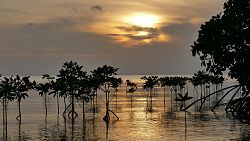

Today (26 July) is the International Day for the Conservation of the Mangrove Ecosystem.
The day was adopted by the General Conference of the United Nations Educational, Scientific and Cultural Organisation's (UNESCO) in 2015.
Mangroves are rare, spectacular and prolific ecosystems on the boundary between land and sea. These ecosystems contribute to the wellbeing, food security, and protection of coastal communities worldwide.
They support a rich biodiversity and provide a valuable nursery habitat for fish and crustaceans, a food source for monkeys, deer, birds, kangaroos, and a source of nectar for honeybees. Managing and restoring mangrove ecosystems is an achievable and cost effective way to help ensure food security for many coastal communities.
Mangroves also act as a form of natural coastal defense against storm surges, tsunamis, rising sea levels, and erosion. A 500-meter mangrove strip reduces wave heights by 50 to 99%.
Their soils are highly effectively carbon sinks, sequestering vast amounts of carbon. One hectare of mangrove can store 3,754 tons of carbon, which is the equivalent of taking 2,650+ cars off the road for one year.
If destroyed, degraded or lost, mangroves become sources of carbon dioxide. Experts estimate that carbon emissions from mangrove deforestation account for up to 10% of emissions from deforestation globally, despite covering just 0.7% of land coverage.
UNESCO marine World Heritage sites host 9% of global mangrove carbon assets.
Mangroves are disappearing three to five times faster than overall global forest losses, with serious ecological and socio-economic impacts. Current estimates indicate that mangrove coverage has been divided by two in the past 40 years.
UNESCO's Biosphere Reserves offer a unique blueprint to protect mangrove ecosystems. In these areas, UNESCO is committed to implementing science-based solutions in coordination with local and indigenous communities, to support humanity's ability to cope with socio-ecological change.
UNESCO Director-General, Audrey Azoulay, said: "Mangroves are in danger: it has been estimated that more than three quarters of mangroves in the world are now threatened and with them all the aquatic and terrestrial organisms that depend on them. This is why UNESCO has decided to act to protect them, along with other valuable blue carbon ecosystems, through its Geoparks, World Heritage sites and biosphere reserves".
"We are working to protect mangroves and to better support scientific research into these environments. However, we cannot do this alone. We also need you".
For more information on this subject, see: